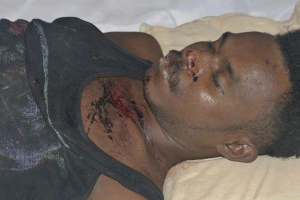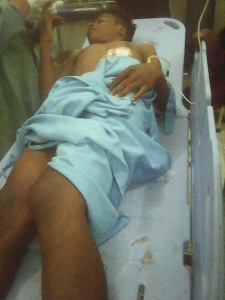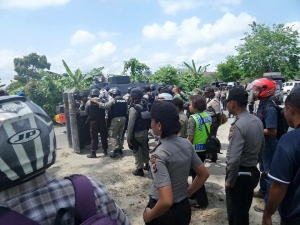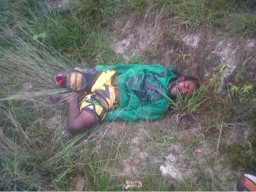also see footage on https://www.sbs.com.au/news/exclusive-footage-shows-indonesian-forces-opening-fire-on-papuan-protesters
Media Release: Rights group condemns attack on protestors in Deiyai
29 August 2019
Institute for Papuan Advocacy & Human Rights today condemns the fatal shootings in the military attack on protestors in Deiyai yesterday. Paula Makabory spokesperson for Institute for Papuan Advocacy and Human Rights (IPAHR) calls for an end to the violence and help for the shooting victims.
Paula Makabory said today ‘The Indonesian President must stand down the Indonesian security forces in West Papua. They are the perpetrators who triggered this conflict at a peaceful demonstration.’
‘In this case, Indonesian security forces triggered the conflict by calling the locals “monkeys.” They ridiculed the demonstrators first and then attacked them with tear gas. When some local people responded with traditional bows and arrows the military opened fire with live ammunition and killed civilians,’ Makabory said.
‘This incident is part of a broader pattern of violence in Deiyai,’ said Dr. Eben Kirksey, an Associate Professor of Anthropology at Deakin University in Melborune. Kirksey traveled to Deiyai in 2018 where he found evidence of 29 extrajudicial killings by Indonesian security forces over the past two decades. “The United Nations has requested access to West Papua to investigate this long history of killings,” Dr. Kirksey said. “The Indonesian government should stop stone walling and grant access to UN Special Rapporteurs.”
Paula Makabory went on to say, ‘a Genocide is happening in West Papua. Provocation of conflict by Indonesian security forces in Deiyai is evidence of genocidal intent by the Indonesian military against ethnic Papuans. Military operations against the Papuan people have been intensifying in the remote mountainous areas in recent months.’
‘West Papua, must be opened up to outside world, especially the mountainous region of Deiyai, Paniai, Puncak Jaya and Nduga, for an independent Human Rights investigation by the United Nations Human Rights Commissioner and especially, the UN Special Rapporteurs on Torture and Extra Judicial Killings.’
Chronology: Deiyai 28 August, 2019,
It is reported by the local sources by phone to Institute of Papua Advocacy & Human Rights that there were 12 incoming airplanes to Enarotali airport from Timika which dropped additional an large number of Indonesian army into the region. These soldiers then deployed to Deiyai District, during the mass demonstration at the Regent office.
The demonstration was initially peaceful. When security forces started calling the Papua demonstrators ‘monkeys’ the demonstrators became agitated. The security forces then fired tear gas into the crowd. While protestors were suffering impacts from the tear gas the army started firing live ammunition. Local indigenous people were reportedly armed with traditional bows and arrows. They reportedly retaliated with arrows after the firing of the tear gas and bullets. The intention of the troops of Indonesia military and police was clearly to provoke the anger of the people and justify the use of lethal force.
An unknown number of local people were killed from bullet wounds and 5 security forces were shot by arrows from the demonstrators. It is noted that yesterday Reuters and Aljazeera report that 6 people were killed in the incident.
Among the civilians a 20 year old named Alpius Pigai was shot dead. Several young children aged 9 and 10 that were shot and injured. Martinus Iyai 27 was shot in the thigh and Naomi Pigome was also injured at the crime scene. Pictures of two civilians shot in the incident are circulating on social media. One shows a young woman with mid abdominal wound and a young man with patch over a shoulder injury in the hospital.
It is reported that some of the victims couldn’t be approached to be identified because the security forces were standing guard. Medical care of these injured people appears to be hampered by the security forces. It was reported that 5 security forces and 3 local victims were sent and being treated at the public hospital.
Contact:
Paula Makabory +61 (0) 423451540
Institute for Papuan Advocacy & Human Rights Inc. Email: ipahrcontact@gmail.com
Email: paulagodwin30@yahoo.com
Contact:
Dr. Eben Kirksey +61 (0) 448379170
S. Eben Kirksey, Ph.D.
Associate Professor of Anthropology
Alfred Deakin Institute for Citizenship and Globalisation
Deakin University
Geelong Waurn Ponds Campus, Locked Bag 20000, Geelong, VIC 3220, Australia eben.kirksey@deakin.edu.au | +61 3 522 78734
At least seven civilians were shot dead during a demonstration against racism in Deiyai, The seven civilians were named Alpius Pigai (20 years), Derikson Adii (21), Hans Ukago (27), Marinus Ikomouw (35), a surnamed Pakege, and two other victims who were still detained at the Paniai Regional General Hospital . The shooting took place on Wednesday this week, August 28. Around 7 am to 11 noon local time, around 3000 thousands people were gathering for the demonstration of the Deiyai Anti-Racism gathered at the Waghete soccer field, Deiyai, Papua. They then walked to the Regent’s office.
Regent ofvDeiyai at that time was not there. At around 12:30, they made speeches in the office yard. “Before the demonstrants arrived, the Indonesian security forceshad arrived first,.
At 2 pm one of the local named Karel Kotouki, 67 years old was shot at his foot. The shooting caused panic and triggering the emotions of the demonstrants.
As a result, the empty district office was stoned by the protestors. The security forces fired tear gas into the crowds and while protestors were suffering impact from the tear gas and scattered around, the security forces started fire live amunitions. The locals fired arrows at the security forces. Three civilians were shot dead on the spot. The three civilians were Alpius Pigai and two other victims whose bodies were still in Paniai District Hospital, Douw said.
Four other civilians who died were not in the same spot. Some died in the middle of the road. the road.
The victim named Marinus Ikomouw has been buried by his family. While the body of Alpius Pigai has been taken from Paniai District Hospital. A victim named Derikson Adii, the son of a the pastor who has just finished his theological studies.
Beside the seven civilians killed, there were 15 other civilians injured and treated at Paniai District Hospital. There were also five other wounded victims treated by their families, had not yet received hospital treatment. They are: Apiin Mote (32 years) shot in the right butt, bullet pierced to the side; Naomi Pigome (28), fell into a ditch when exposed to tear gas, a cut on the left calf; Marthinus Iyai (27), shot in the right thigh; Yanto Dogopia (10), shot in the left thigh; and Yusti Agapa (17) shot in the right thigh pierced by bullet.
One army member of the security forces was killed, there were six personnel who were shot by arrows.
Reported by Yones Douw, Head of the Justice and Peace Department of the Kingmi Church Synod in the Land of Papua.
Additional info from other source,
It was reported by some Indonesian media that that The army member who died was Sertu Rikson Edi Chandra (38 years) from Kodam II / Sriwijaya.
https://www.sbs.com.au/news/footage-shows-indonesian-forces-opening-fire-on-papuan-protesters






















